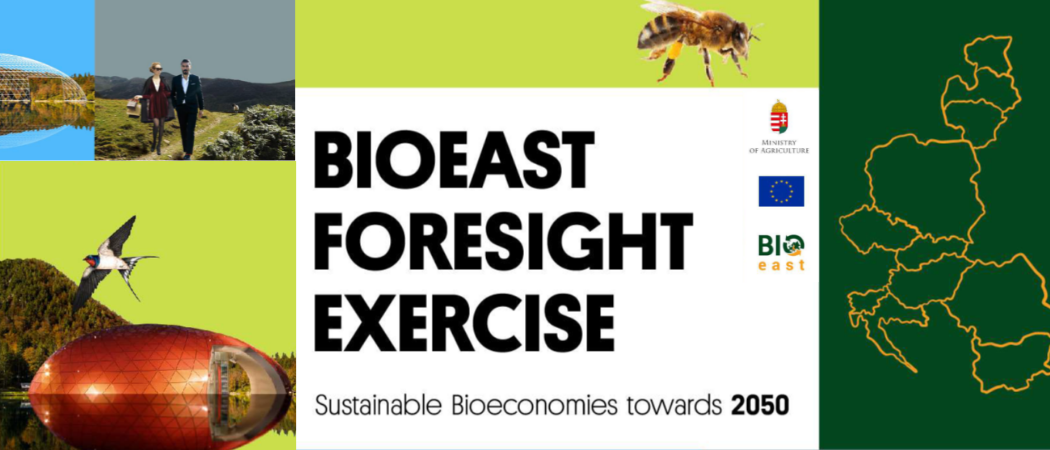The Central-Eastern European Initiative for Knowledge-based Agriculture, Aquaculture and Forestry in the Bioeconomy (BIOEAST) provides a shared strategic research and innovation framework for working towards circular bioeconomies in the CEE countries, underpinned by a common political commitment.

Through this Initiative, the 11 countries have set a vision for 2030 to develop knowledge and cooperation-based circular bioeconomies. The goal is to enhance their inclusive growth and to create jobs, especially in rural areas, while also strengthening environmental sustainability.
To generate new insights about possible pathways for the deployment of bioeconomies in the macro-region, the Initiative conducted a year-long foresight exercise focused on the particularities of the regional bioeconomies and their research, innovation and education needs. The conclusions, which were presented to member states’ ministers during the EU’s AGRIFISH Council in December, are designed to inform policy- and decision-makers, and contribute to the development of the BIOEAST Strategic Research and Innovation Agenda.
Four scenarios for the development of the bioeconomy
As part of the foresight exercise, the Initiative organised dedicated workshops in all 11 countries at which local stakeholders could express their viewpoint and provide inputs. The workshops informed the development of four specific scenarios represented by stereotypes of everyday citizens: (I) A fully thriving circular bioeconomy, based on research achievements, but not necessarily connected with society, represented by a technocrat researcher. (II) The linear bioeconomy embodied by a 50-year-old CEO who wishes to maximize profit, but is not necessarily interested in changing the status quo. (III) A worker, member of trade union, sceptical of innovative ideas and changes, satisfied with the current setup and the business as usual. (IV) A young entrepreneur embodies a sustainable and non-profit based bioeconomy underpinned by a society committed to a sustainable and circular future.
The different scenarios reflect the ongoing structural changes in Central and Eastern Europe. Thirty years ago, the region went through a major socio-economic change, as it adopted a market-based economy. Now that economic model needs to evolve again to incorporate environmental and social aspects. Thus, the macro-region is again facing a major transition period in which society will need to adapt to a circular and sustainable model. Given that some CEE countries have yet to complete the first transition, there is a difficult process ahead of policy makers.
Developing national bioeconomy strategies
The coordinated action arising from the BIOEAST Initiative is a clear recognition of the vital role of research and innovation in the future of policymaking. In September 2021, the outcomes of the foresight exercise were presented to the public and they were sincerely welcomed by stakeholders, including public administration and domain experts. The combination of the expert report, a position paper of ministries from the 11 countries and a reflection paper of the BIOEAST Advisory Council amounts to a full-scale assessment of the urgent need to develop national bioeconomy strategies supported by research and innovation related investments.
Scientists claim that without sustainable and circular use of the available bioresources we will not achieve the global targets set for our society. Therefore, strategic thinking on biomass valorisation is a top priority for each country. Key policies in the agri-food, bio-based-industry and energy domains will need to be radically revised to comply with the green transition. Biomass is set to play a central role in the shift away from a fossil fuel-based economy.
The importance of political support
The position paper issued by the ministries supports the main recommendation of the foresight report for a transition from a linear to circular bioeconomy model underpinned by the principles of sustainability, resilience and climate neutrality. It also reiterates the foresight experts’ warning about what the macro-region lacks in terms of governance and connectivity, resources and finances, jobs, knowledge and education.
The Advisory Council of the BIOEAST Initiative also reinforced the experts’ recommendations. In the Council’s reflection on the foresight report’s findings, 19 high-level experts from different fields and societal backgrounds emphasised the timeliness of the transition, which complements the EU´s ambitious plans. The Council also called for BIOEAST countries to agree on a clear understanding/definition of a sustainable circular bioeconomy, backed by political recognition of its importance to the sustainable transition.
The conference conclusions presented to ministers during the Council meeting highlighted the need to prioritise the bioeconomy at a national level. Policymakers should prioritise raising awareness of the importance of investing in specific national research and innovation calls, and in national bioeconomy development programmes. By setting priorities for the macro-region and coordinating and supplementing national initiatives, BIOEAST is playing a highly beneficial role.
Foresight Experts’ Report: https://bioeast.eu/wp-content/uploads/2021/10/BIOeast-Report-2021_FINAL_compressed-1.pdf
Foresight conference documents: https://bioeast.eu/events/bioeast-foresight-conference-climate-neutral-future-depends-on-sustainable-bioeconomies/
BIOEASTsUP Horizon 2020 project made available the finances of the Foresight exercise: https://bioeast.eu/bioeastsup/





 A unique international forum for public research organisations and companies to connect their external engagement with strategic interests around their R&D system.
A unique international forum for public research organisations and companies to connect their external engagement with strategic interests around their R&D system.